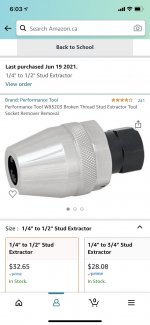D
Deleted member 54626
Guest
The heads of the torx screws that fasten aluminum guards to the motor have become totally rounded.
Tried heat + bit-extractors and this did not work.
Anybody knows of a machine shop in around Mississauga that has the expertise and tools to unscrew the two screws?
(the screws go into the cylinder body)
Help!
Here is the ph numbetr of a machinist (independent) I have used in the past. He is currently selling his shop as he is now 73. I just spoke to him, he can give it a shot for you. He is up by Steeles and Weston or somewhere around there
416-573-0085











/cloudfront-us-east-1.images.arcpublishing.com/octane/VZP7EERSAG2T7RGZ2PJUAMHCM4.jpg)





